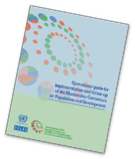Cai Yiping is a member of DAWN’s Executive Committee and is on DAWN’s Sexual Health and Reproductive Rights (SRHR) team.
This article is published in the DAWN Informs June 2016 Edition.
First and foremost, the Operational Guide for implementation and follow-up of the Montevideo Consensus sets up a comprehensive, human rights-based framework to achieve gender equality and women’s human rights with focus on action and implementation, linking the International Conference on Population and Development Program of Action (ICPD, 1994), the Beijing Platform for Action adopted at the Fourth World Conference on Women (1995), the Convention on Elimination of All Forms of Discrimination against Women (CEDAW, 1979) and the sustainable development goals (SDGs, 2015).
Especially the Operational Guide develops the roadmap for implementation that facilitates the translation from policy to action. The only way to close the gap in the implementation of the ICPD Program of Action is to take action with a clear roadmap, from laws and policies to national action plans and adequate investment – monitored and reviewed with appropriate indicators and with strong institutional support.
What is the role of the regional documents, such as Montevideo Consensus and the Operational Guide? How can they be linked with the commitments made at the global level and the implementation of these commitments at the national level? What do they to do with the transparency and accountability? How can they can be instructive to lift the bar higher?
For example, Agenda 2030 adopted by UN General Assembly in September 2015 agreed, as did the ICPD Program of Action more than twenty years ago, these goals are the common minimum floor. Governments should be free to implement higher and more ambitious targets. In this context, we should not undermine commitments already made and achievements that have been made at the regional level in the previous review process. Because commitment is commitment, no matter where you made it, on national, regional or global level. Therefore, we need to strongly reaffirm these commitments and build the future actions and policies on this foundation and move forward.
After more than twenty years it is time, not only to renew the commitments of ICPD, along with ICPD reviews, but also to comprehend and redefine these commitments that are deeply and firmly embedded in the spirit of narratives, and inspired by the ICPD Program of Action and the Beijing Platform for Action, which are still relevant nowadays. For example, the recognition of sexual and reproductive health and rights; indispensable link of rights to development and human rights; country-led implementation and sovereign responsibility of state in the context of acceleration of implementation, not the excuse for not implementing it.
 The Montevideo Consensus promotes measures aimed at subverting structural inequalities and multiple discriminations based on gender, age, race-ethnicity, sexual orientation, gender identity, territory and immigration status, and at promoting empowerment and autonomy of women and girls. Therefore, the monitoring indicators should respond to these policy objectives. In this sense, in order to be consistent with the human rights approach promoted in the Montevideo Consensus, the capacity to measure availability, accessibility, acceptability and quality of services as well as indicators to measure the protection, promotion and fulfillment of sexuality rights should be created. For example, through population surveys it is possible to monitor the percentage of the population (disaggregated by different categories) that makes free and informed decisions about sexuality. Unsurprisingly, this is echoed in the theme of 49th session of UN Commission on Population and Development (CPD49) in April 2016, which is “Strengthening the Demographic Evidence Base for Post 2015 Development Agenda”. Sustainable development cannot be achieved without evidence-based policies, programs, and governance.
The Montevideo Consensus promotes measures aimed at subverting structural inequalities and multiple discriminations based on gender, age, race-ethnicity, sexual orientation, gender identity, territory and immigration status, and at promoting empowerment and autonomy of women and girls. Therefore, the monitoring indicators should respond to these policy objectives. In this sense, in order to be consistent with the human rights approach promoted in the Montevideo Consensus, the capacity to measure availability, accessibility, acceptability and quality of services as well as indicators to measure the protection, promotion and fulfillment of sexuality rights should be created. For example, through population surveys it is possible to monitor the percentage of the population (disaggregated by different categories) that makes free and informed decisions about sexuality. Unsurprisingly, this is echoed in the theme of 49th session of UN Commission on Population and Development (CPD49) in April 2016, which is “Strengthening the Demographic Evidence Base for Post 2015 Development Agenda”. Sustainable development cannot be achieved without evidence-based policies, programs, and governance.
Good statistics will help to monitor progress and to hold leaders accountable for their activities and achievements. Investing in statistical capacity in demography, public health, human rights, migration, economic growth, employment and climate change makes it possible to understand their linkages and impact on sustainable development and to shape the policy process.
Data and indicators should respond to the policy objectives. Civil society, especially women’s and youth organizations, plays an important role in collecting and evaluating gender statistics and data.
Reaching consensus and agreement is only the first step of a long journey and it doesn’t solve the problems we need to tackle. It shows that we are ready to take the challenges along the rocky road to gender equality and realisation of women’s human rights.
